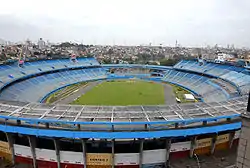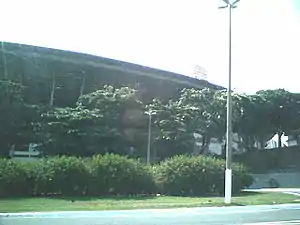 | |
| Full name | Estádio Octávio Mangabeira |
|---|---|
| Location | R. Lions Club, 217-547, Nazaré, Salvador, Brazil |
| Owner | Bahia State Government |
| Capacity | 60,000 |
| Field size | 105 x 68m |
| Surface | Grass |
| Construction | |
| Broke ground | January 28, 1951 |
| Built | 1951 |
| Opened | 1951 |
| Expanded | 1969-1971 |
| Closed | November 26, 2007 |
| Demolished | June-October 2010 |
| Tenants | |
| Esporte Clube Bahia Esporte Clube Vitória | |

The Estádio Fonte Nova, also known as Estádio Octávio Mangabeira, was a football stadium inaugurated on January 28, 1951 in Salvador, Bahia,[1] with a maximum capacity of 66,080 people.[2] The stadium was owned by the Bahia government, and was the home stadium of Esporte Clube Bahia and Esporte Clube Vitória.[1] Its formal name honors Octávio Cavalcanti Mangabeira (1886–1960), a civil engineer, journalist, and former Bahia state governor from 1947 to 1954.[2]
After part of the upper terraces collapsed in 2007, killing 7 people and injuring several others, the government of Bahia announced the demolition of Fonte Nova and the construction of a new stadium, the Arena Fonte Nova, in the same place.
The stadium was nicknamed Fonte Nova because it was located at Ladeira das Fontes das Pedras.[2]
History
The stadium construction ended in 1951. On March 4, 1971, the stadium was reinaugurated, after a great reformation involving the addition of a second tier, which expanded the maximum stadium capacity from 35,000 to 110,000. In the reinauguration day, two matches were played: Bahia against Flamengo, and Vitória against Grêmio. On that day happened a big tumult, where two people died.[2]
The inaugural match was played on January 28, 1951, when Guarany and Botafogo, both local Bahia state teams, drew 2-1. The first goal of the stadium was scored by Guarany's Nélson.[1]
The stadium's attendance record currently stands at 110,438, set on February 12, 1989 when Bahia beat Fluminense 2-1.[2]
On November 25, 2007, when the Brazilian Championship Third Division match between Bahia and Vila Nova was nearly over with more than 60,000 supporters in attendance,[3] a section of the stadium's highest terraces collapsed when Bahia's supporters were celebrating the club's promotion to the Brazilian Championship Second Division, killing seven people[4] and injuring forty others.[5][6] Jacques Wagner, the governor of Bahia state at the time, ordered the stadium to be closed as the causes of the accident are under investigation by the authorities,[7] and he also said on November 26, 2007 that the stadium may be demolished if its structure is compromised.[8] On November 27, 2007, the governor of Bahia announced that Estádio Fonte Nova would be demolished, and that a new stadium would be built in its place.[9] On September 28, 2008, Bahia's governor Jaques Wagner announced that instead of being demolished, the stadium would be reformed into a multiuse arena with a maximum capacity of 60,000 people seated.[10]
Demolition of the Octavio Mangabeira Stadium began in June 2010 and is expected to be finished by August - the upper tier was demolished using explosives on August 29, 2010. After the implosion, a portion of the upper tier was left standing, which was dismantled manually until October. The Bahia Arena was constructed as a venue for the 2016 Summer Olympics for football tournaments.[11] During its construction, Bahia played in Estádio de Pituaçu.
References
- 1 2 3 "Estádio Fonte Nova". Templos do Futebol. Retrieved 2007-11-25.
- 1 2 3 4 5 Enciclopédia do Futebol Brasileiro Lance Volume 2. Rio de Janeiro: Aretê Editorial S/A. 2001. pp. 461–462. ISBN 85-88651-01-7.
- ↑ "Tragédia anunciada". Jornal Hoje. Retrieved 2007-11-26.
- ↑ "Futebol-Torcida do Bahia vê fim do casamento com Fonte Nova". BBC News. Archived from the original on 2007-06-21. Retrieved 2007-11-26.
- ↑ "Nove pessoas morrem após partida do Bahia na Série C". Estadão. Retrieved 2007-11-25.
- ↑ "Brazil Stadium Bleacher Collapses, 8 Die". Daily Comet. Retrieved 2007-11-25.
- ↑ "Seven Brazil football fans killed". BBC News. November 26, 2007. Retrieved 2007-11-26.
- ↑ "Governador da Bahia diz que a Fonte Nova pode ser demolida". Folha Online. Retrieved 2007-11-26.
- ↑ "Governo da Bahia anuncia demolição da Fonte Nova". CorreioWeb. Retrieved 2007-11-27.
- ↑ Ayres, Nelson (2008-09-28). "Sem demolição - Fonte ficará de pé". Lance! (3969): 21.
- ↑ Rio2016.org.br bid package. Archived 2010-11-12 at the Wayback Machine Volume 2. p. 23.